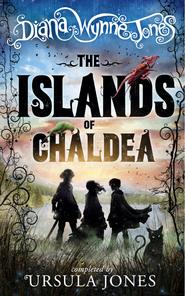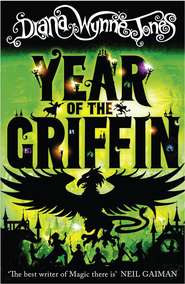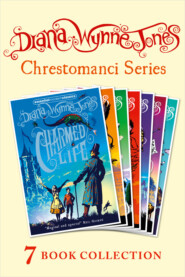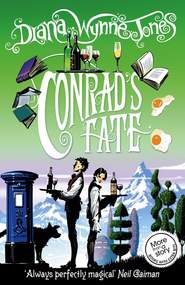По всем вопросам обращайтесь на: info@litportal.ru
(©) 2003-2024.
✖
The Land of Ingary Trilogy
Настройки чтения
Размер шрифта
Высота строк
Поля
“Buying!” Martha cried. Her thumbs whirled. “That takes her half a morning. I’ve seen her, Sophie, and heard the talk. She’s off in a hired carriage and new clothes on your earnings, visiting all the mansions down the valley! They’re saying she’s going to buy that big place down at Vale End and set up in style. And where are you?”
“Well, Fanny’s entitled to some pleasure after all her hard work bringing us up,” Sophie said. “I suppose I’ll inherit the shop.”
“What a fate!” Martha exclaimed. “Listen—”
But at that moment two empty cake racks were pulled away at the other end of the room, and an apprentice stuck his head through from the back somewhere. “Thought I heard your voice, Lettie,” he said, grinning in the most friendly and flirtatious way. “The new baking’s just up. Tell them.” His head, curly and somewhat floury, disappeared again. Sophie thought he looked a nice lad. She longed to ask if he was the one Martha really liked, but she did not get a chance. Martha sprang up in a hurry, still talking.
“I must get the girls to carry all these through to the shop,” she said. “Help me with the end of this one.” She dragged out the nearest rack and Sophie helped her hump it past the door into the roaring, busy shop. “You must do something about yourself, Sophie,” Martha panted as they went. “Lettie kept saying she didn’t know what would happen to you when we weren’t around to give you some self-respect. She was right to be worried.”
In the shop Mrs Cesari seized the rack from them in both massive arms, yelling instructions, and a line of people rushed away past Martha to fetch more. Sophie yelled goodbye and slipped away in the bustle. It did not seem right to take up more of Martha’s time. Besides, she wanted to be alone to think. She ran home. There were fireworks now, going up from the field by the river where the Fair was, competing with the blue bangs from Howl’s castle. Sophie felt more like an invalid than ever.
She thought and thought, most of the following week, and all that happened was that she became confused and discontented. Things just did not seem to be the way she thought they were. She was amazed at Lettie and Martha. She had misunderstood them for years. But she could not believe Fanny was the kind of woman Martha said.
There was a lot of time for thinking, because Bessie duly left to be married and Sophie was mostly alone in the shop. Fanny did seem to be out a lot, gadding or not, and trade was slack after May Day. After three days Sophie plucked up courage to ask Fanny, “Shouldn’t I be earning a wage?”
“Of course, my love, with all you do!” Fanny answered warmly, fixing on a rose-trimmed hat in front of the shop mirror. “We’ll see about it as soon as I’ve done the accounts this evening.” Then she went out and did not come back until Sophie had shut the shop and taken that day’s hats through to the house to trim.
Sophie at first felt mean to have listened to Martha, but when Fanny did not mention a wage, either that evening or any time later that week, Sophie began to think that Martha had been right.
“Maybe I am being exploited,” she told a hat she was trimming with red silk and a bunch of wax cherries, “but someone has to do this or there will be no hats at all to sell.” She finished that hat and started on a stark black and white one, very modish, and a quite new thought came to her. “Does it matter if there are no hats to sell?” she asked it. She looked round the assembled hats, on stands or waiting in a heap to be trimmed. “What good are you all?” she asked them. “You certainly aren’t doing me a scrap of good.”
And she was within an ace of leaving the house and setting out to seek her fortune, until she remembered she was the eldest and there was no point. She took up the hat again, sighing.
She was still discontented, alone in the shop next morning, when a very plain young woman customer stormed in, whirling a pleated mushroom bonnet by its ribbons. “Look at this!” the young lady shrieked. “You told me this was the same as the bonnet Jane Farrier was wearing when she met the Count. And you lied. Nothing has happened to me at all!”
“I’m not surprised,” Sophie said, before she had caught up with herself. “If you’re fool enough to wear that bonnet with a face like that, you wouldn’t have the wit to spot the King himself if he came begging – if he hadn’t turned to stone first just at the sight of you.”
The customer glared. Then she threw the bonnet at Sophie and stormed out of the shop. Sophie carefully crammed the bonnet into the wastebasket, panting rather. The rule was: Lose your temper, lose a customer. She had just proved that rule. It troubled her to realise how very enjoyable it had been.
Sophie had no time to recover. There was the sound of wheels and horse hoofs and a carriage darkened the window. The shop bell clanged and the grandest customer she had ever seen sailed in, with a sable wrap drooping from her elbows and diamonds winking all over her dense black dress. Sophie’s eyes went to the lady’s wide hat first – real ostrich plume dyed to reflect the pinks and greens and blues winking in the diamonds and yet still look black. This was a wealthy hat. The lady’s face was carefully beautiful. The chestnut-brown hair made her seem young, but… Sophie’s eyes took in the young man who followed the lady in, a slightly formless-faced person with reddish hair, quite well dressed, but pale and obviously upset. He stared at Sophie with a kind of beseeching horror. He was clearly younger than the lady. Sophie was puzzled.
“Miss Hatter?” the lady asked in a musical but commanding voice.
“Yes,” said Sophie. The man looked more upset than ever. Perhaps the lady was his mother.
“I hear you sell the most heavenly hats,” said the lady. “Show me.”
Sophie did not trust herself to answer in her present mood. She went and got out hats. None of them were in this lady’s class, but she could feel the man’s eyes following her and that made her uncomfortable. The sooner the lady discovered the hats were wrong for her, the sooner this odd pair would go. She followed Fanny’s advice and got out the wrongest first.
The lady began rejecting hats instantly. “Dimples,” she said to the pink bonnet, and “Youth” to the caterpillar-green one. To the one of twinkles and veils she said, “Mysterious allure. How very obvious. What else have you?”
Sophie got out the modish black and white, which was the only hat even remotely likely to interest this lady.
The lady looked at it with contempt. “This one doesn’t do anything for anybody. You’re wasting my time, Miss Hatter.”
“Only because you came in and asked for hats,” Sophie said. “This is only a small shop in a small town, Madam. Why did you—” Behind the lady, the man gasped and seemed to be trying to signal warningly “—bother to come in?” Sophie finished, wondering what was going on.
“I always bother when someone tries to set themselves up against the Witch of the Waste,” said the lady. “I’ve heard of you, Miss Hatter, and I don’t care for your competition or your attitude. I came to put a stop to you. There.” She spread out her hand in a flinging motion towards Sophie’s face.
“You mean you’re the Witch of the Waste?” Sophie quavered. Her voice seemed to have gone strange with fear and astonishment.
“I am,” said the lady. “And let that teach you to meddle with things that belong to me.”
“I don’t think I did. There must be some mistake,” Sophie croaked. The man was now staring at her in utter horror, though she could not see why.
“No mistake, Miss Hatter,” said the Witch. “Come, Gaston.” She turned and swept to the shop door. While the man was humbly opening it for her, she turned back to Sophie. “By the way, you won’t be able to tell anyone you’re under a spell,” she said. The shop door tolled like a funeral bell as she left.
Sophie put her hands to her face, wondering what the man had stared at. She felt soft, leathery wrinkles. She looked at her hands. They were wrinkled too, and skinny, with large veins in the back and knuckles like knobs. She pulled her grey skirt against her legs and looked down at skinny, decrepit ankles and feet which had made her shoes all knobbly. They were the legs of someone about ninety and they seemed to be real.
Sophie got herself to the mirror, and found she had to hobble. The face in the mirror was quite calm, because it was what she expected to see. It was the face of a gaunt old woman, withered and brownish, surrounded by wispy white hair. Her own eyes, yellow and watery, stared out at her, looking rather tragic.
“Don’t worry, old thing,” Sophie said to the face. “You look quite healthy. Besides, this is much more like you really are.”
She thought about her situation, quite calmly. Everything seemed to have gone calm and remote. She was not even particularly angry with the Witch of the Waste.
“Well, of course I shall have to do for her when I get the chance,” she told herself, “but meanwhile, if Lettie and Martha can stand being one another, I can stand being like this. But I can’t stay here. Fanny would have a fit. Let’s see. This grey dress is quite suitable, but I shall need my shawl and some food.”
She hobbled over to the shop door and carefully put up the CLOSED notice. Her joints creaked as she moved. She had to walk bowed and slow. But she was relieved to discover that she was quite a hale old woman. She did not feel weak or ill, just stiff. She hobbled to collect her shawl, and wrapped it over her head and shoulders, as old women did. Then she shuffled through into the house, where she collected her purse with a few coins in it and a parcel of bread and cheese. She let herself out of the house, carefully hiding the key in the usual place, and hobbled away down the street, surprised at how calm she still felt.
She did wonder if she should say goodbye to Martha. But she did not like the idea of Martha not knowing her. It was best just to go. Sophie decided she would write to both her sisters when she got wherever she was going, and shuffled on, through the field where the Fair had been, over the bridge, and on into the country lanes beyond. It was a warm spring day. Sophie discovered that being a crone did not stop her enjoying the sight and smell of may in the hedgerows, though the sight was a little blurred. Her back began to ache. She hobbled sturdily enough, but she needed a stick. She searched the hedges as she went for a loose stake of some kind.
Evidently her eyes were not as good as they had been. She thought she saw a stick, a mile or so on, but when she hauled on it, it proved to be the bottom end of an old scarecrow someone had thrown into the hedge. Sophie heaved the thing upright. It had a withered turnip for a face. Sophie found she had some fellow feeling for it. Instead of pulling it to pieces and taking the stick, she stuck it between two branches of the hedge, so that it stood looming rakishly above the may, with the tattered sleeves on its stick arms fluttering over the hedge.
“There,” she said, and her cracked old voice surprised her into giving a cracked old cackle of laughter. “Neither of us are up to much, are we, my friend? Maybe you’ll get back to your field if I leave you where people can see you.” She set off up the lane again, but a thought struck her and she turned back. “Now if I wasn’t doomed to failure because of my position in the family,” she told the scarecrow, “you could come to life and offer me help in making my fortune. But I wish you luck anyway.”
She cackled again as she walked on. Perhaps she was a little mad, but then old women often were.
She found a stick an hour or so later when she sat down on the bank to rest and eat her bread and cheese. There were noises in the hedge behind her: little strangled squeakings, followed by heavings that shook may petals off the hedge. Sophie crawled on her bony knees to peer past leaves and flowers and thorns into the inside of the hedge, and discovered a thin grey dog in there. It was hopelessly trapped by a stout stick which had somehow got twisted into a rope that was tied round its neck. The stick had wedged itself between two branches of the hedge so that the dog could barely move. It rolled its eyes wildly at Sophie’s peering face.
As a girl, Sophie was scared of all dogs. Even as an old woman she was quite alarmed by the two rows of white fangs in the creature’s open jaws. But she said to herself, “The way I am now, it’s scarcely worth worrying about,” and felt in her sewing pocket for her scissors. She reached into the hedge with the scissors and sawed away at the rope round the dog’s neck.
The dog was very wild. It flinched away from her and growled. But Sophie sawed bravely on. “You’ll starve or throttle to death, my friend,” she told the dog in her cracked old voice, “unless you let me cut you loose. In fact, I think someone has tried to throttle you already. Maybe that accounts for your wildness.” The rope had been tied quite tightly round the dog’s neck and the stick had been twisted viciously into it. It took a lot of sawings before the rope parted and the dog was able to drag itself out from under the stick.
“Would you like some bread and cheese?” Sophie asked it then. But the dog just growled at her, forced its way out through the opposite side of the hedge, and slunk away. “There’s gratitude for you!” Sophie said, rubbing her prickled arms. “But you left me a gift in spite of yourself.” She pulled the stick that had trapped the dog out of the hedge and found it was a proper walking stick, well trimmed and tipped with iron. Sophie finished her bread and cheese and set off walking again. The lane became steeper and steeper and she found the stick a great help. It was also something to talk to. Sophie thumped along with a will, chatting to her stick. After all, old people often talk to themselves.
“There’s two encounters,” she said, “and not a scrap of magical gratitude from either. Still, you’re a good stick. I’m not grumbling. But I’m surely due to have a third encounter, magical or not. In fact, I insist on one. I wonder what it will be.”
The third encounter came towards the end of the afternoon when Sophie had worked her way quite high into the hills. A countryman came whistling down the lane towards her. A shepherd, Sophie thought, going home after seeing to his sheep. He was a well set up young fellow of forty or so. “Gracious!” Sophie said to herself. “This morning I’d have seen him as an old man. How one’s point of view does alter!”
When the shepherd saw Sophie mumbling to herself, he moved rather carefully over to the other side of the lane and called out with great heartiness, “Good evening to you, Mother! Where are you off to?”
“Mother?” said Sophie. “I’m not your mother, young man!”
“A manner of speaking,” the shepherd said, edging along against the opposite hedge. “I was only meaning a polite inquiry, seeing you walking into the hills at the end of the day. You won’t get down into Upper Folding before nightfall, will you?”
Sophie had not considered this. She stood in the road and thought about it. “It doesn’t matter really,” she said, half to herself. “You can’t be fussy when you’re off to seek your fortune.”
“Can’t you indeed, Mother?” said the shepherd. He had now edged himself downhill of Sophie and seemed to feel better for it. “Then I wish you good luck, Mother, provided your fortune don’t have nothing to do with charming folks’ cattle.” And he took off down the road in great strides, almost running, but not quite.











